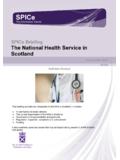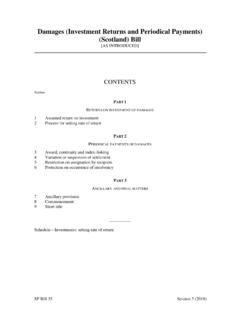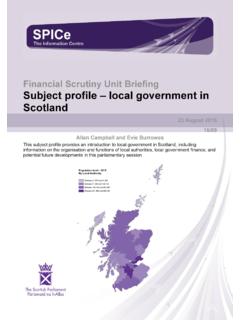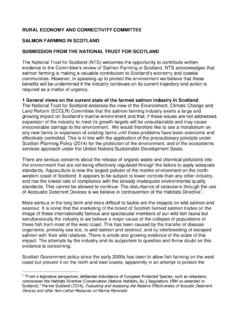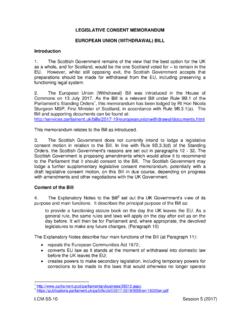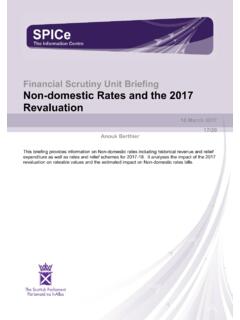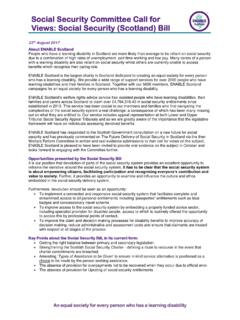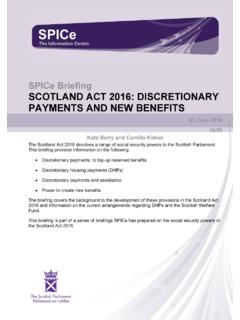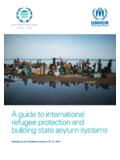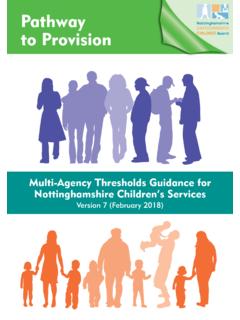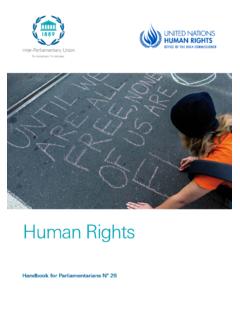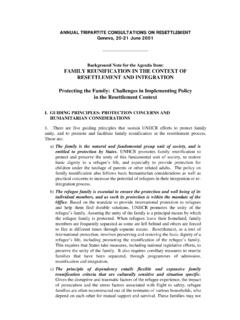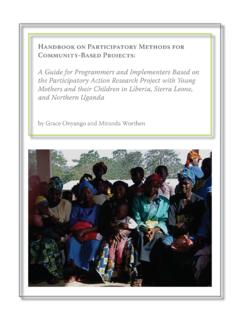Transcription of EQUALITIES AND HUMAN RIGHTS COMMITTEE …
1 EHRiC/S5/18/11/A EQUALITIES AND HUMAN RIGHTS COMMITTEE AGENDA 11th Meeting, 2018 (Session 5) Thursday 19 April 2018 The COMMITTEE will meet at am in the Robert Burns Room (CR1). 1. HUMAN RIGHTS and the Scottish Parliament: The COMMITTEE will take evidence from Nick Hobbs, Head of Advice and Investigations, Children and Young People's Commissioner Scotland; Nora Uhrig, Senior Associate - Programmes Scotland, EQUALITIES and HUMAN RIGHTS Commission; Marie Anderson, Northern Ireland Public Services Ombudsman, Northern Ireland Ombudsman; Judith Robertson, Chair, Scottish HUMAN RIGHTS Commission; and then, in roundtable format, from Delia Henry, Director of Charity Services, Age Scotland; Anthony Horan, Director, Catholic Parliamentary Office of the Bishops' Conference of Scotland; Ally Thomson, Director, Dignity in Dying.
2 Lucy Mulvagh, Director of Policy and Communications, Health and Social Care Alliance; Gordon MacRae, Chief Executive, Humanist Society; Bill Scott, Director of Policy, Inclusion Scotland; Michael Clancy, Director of Law Reform, Law Society of Scotland; EHRiC/S5/18/11/A Graham O'Neill, Policy Officer, Scottish Refugee Council; Helen Martin, Assistant General Secretary, Scottish Trades Union Congress. 2. HUMAN RIGHTS and the Scottish Parliament (in private): The COMMITTEE will consider the evidence received. 3. Age of Criminal Responsibility (Scotland) Bill (in private): The COMMITTEE will consider its approach to the scrutiny of the Bill at Stage 1. 4. Prisoner Voting in Scotland (in private): The COMMITTEE will consider correspondence from the UK Ministry of Justice.
3 Claire Menzies Clerk to the EQUALITIES and HUMAN RIGHTS COMMITTEE Room Scottish Parliament Edinburgh Tel: 0131 348 5217 Email: EHRiC/S5/18/11/A The papers for this meeting are as follows Paper from the Clerk EHRiC/S5/18/11/1 Summary of written evidence EHRiC/S5/18/11/2 PRIVATE PAPER EHRiC/S5/18/11/3 (P) PRIVATE PAPER EHRiC/S5/18/11/4 (P) PRIVATE PAPER EHRiC/S5/18/11/5 (P) Agenda Item 1 EHRiC/S5/18/11/1 19 April 2018 1 EQUALITIES and HUMAN RIGHTS COMMITTEE 11th Meeting, 2018 (Session 5) - Thursday 19 April 2018 HUMAN RIGHTS and the Scottish Parliament Inquiry Background 1. In 2017 the EQUALITIES and HUMAN RIGHTS COMMITTEE launched its inquiry on HUMAN RIGHTS and the Scottish Parliament. This inquiry follows on from the report of the Commission on Parliamentary Reform.
4 2. The COMMITTEE is conducting the inquiry in two phases. The first phase consisted of a literature review of UK and international legislatures HUMAN RIGHTS models, which has been completed. This is available on the inquiry website. The second phase focuses on evidence gathering. Written submissions received to date are available on the inquiry webpage. Oral evidence 3. At its meeting on 19 April 2018, the COMMITTEE will hold its second oral evidence taking session of the inquiry. Written submissions from eight of the witnesses giving evidence at that meeting are attached in the annex to this paper, for information. The submissions are from are: Nick Hobbs, Head of Advice and Investigations, Children and Young People's Commissioner Scotland; Nora Uhrig, Senior Associate - Programmes Scotland, EQUALITIES and HUMAN RIGHTS Commission; Judith Robertson, Chair, Scottish HUMAN RIGHTS Commission; Anthony Horan, Director, Catholic Parliamentary Office of the Bishops' Conference of Scotland; Ally Thomson, Director, Dying in Dignity; Lucy Mulvagh, Director of Policy and Communications, Health and Social Care Alliance; Gordon MacRae, Chief Executive, Humanist Society; and Michael P.
5 Clancy, Director of Law Reform, Law Society of Scotland; Se n Wixted Assistant Clerk to the COMMITTEE 13 April 2018 Agenda Item 1 EHRiC/S5/18/11/1 19 April 2018 ANNEX 2 SUBMISSON FROM CHILDREN AND YOUNG PEOPLE S COMMISSIONER Equality and HUMAN RIGHTS COMMITTEE Inquiry on HUMAN RIGHTS and the Scottish Parliament Introduction We welcome this EQUALITIES and HUMAN RIGHTS COMMITTEE Inquiry which recognises the important role that the Scottish Parliament has as a HUMAN RIGHTS guarantor. One of the priorities in our strategic plan, laid before Parliament in March, is to establish a culture of children s HUMAN RIGHTS in Scotland. Children do not have the same political or economic power as adults it is therefore essential that in its role as a HUMAN RIGHTS guarantor the Scottish Parliament pays particular attention to children and young people s RIGHTS and ensures that they are fully involved in decision making.
6 It is worth noting that the majority of existing studies exploring the role of parliament as a HUMAN RIGHTS guarantor do not consider children and young people as RIGHTS holders distinct from adult RIGHTS holders. Where studies have considered younger people, they have focused on young people rather children . In our recent response to the COMMITTEE s call for evidence around opportunities for Parliamentary involvement in the UPR process, we highlighted numerous resolutions from the HUMAN RIGHTS Council, indicating its commitment to increasing the involvement of parliaments in the Universal Periodic Review (UPR) process1 - in recognition of the important role that legislatures can play in holding the executive to account on their HUMAN RIGHTS record.
7 In 2015, the UN HUMAN RIGHTS Council prioritised exploring the possible synergies between the Council and parliaments in order to ensure that the UPR has the greatest impact at the national At a panel discussion on the contribution of Parliaments to the work of the HUMAN RIGHTS Council (June 2016), Adam Abdelmoula, Director of the HUMAN RIGHTS Council and Treaty-Mechanisms Division further noted that that there was growing 1 2 HUMAN RIGHTS Council, Resolution 30/14 on the Contribution of parliaments to the work of the HUMAN RIGHTS Council, 1 October 2015, UN Doc A/HRC/RES/30/14 (2015). Agenda Item 1 EHRiC/S5/18/11/1 19 April 2018 ANNEX 3 international consensus about the importance of the role of parliaments in the promotion and protection of HUMAN Context The essential role of parliaments in ongoing monitoring of HUMAN RIGHTS at national level has been clearly articulated by the UN General Assembly, the HUMAN RIGHTS Council, UN HUMAN RIGHTS treaty bodies, the Inter-Parliamentary Union (IPU), the Council of Europe (CoE)4 and the European Union5.
8 This developing understanding and clarity around the role of national parliaments in being effective HUMAN RIGHTS guarantors should provide considerable stimulus for the Scottish Parliament in its broad role and for the EHRiC COMMITTEE as it progresses its work programme. When it comes to HUMAN RIGHTS promotion and protection, the Scottish Parliament and Members of the Scottish Parliament (MSPs) are essential actors. MSPs are the elected representatives of the people, and the Scottish Parliament has the power and responsibility to establish a legislative framework favourable for HUMAN RIGHTS , to ensure implementation of international HUMAN RIGHTS obligations, to safeguard appropriate funding for HUMAN RIGHTS policies through the budgetary process, to scrutinise the Scottish Government, and to raise awareness of HUMAN RIGHTS issues.
9 National Parliaments are in a unique position to entrench HUMAN RIGHTS into their work, particularly in monitoring and scrutinising Governments in fulfilment of their international HUMAN RIGHTS commitments. Specifically they should: Ensure that HUMAN RIGHTS obligations under constitutional and international law are implemented openly, constructively, innovatively and proactively and that international HUMAN RIGHTS provisions are mainstreamed into their national law, preferably through incorporation and, if possible, by giving the norms constitutional status; 3 4 UN General Assembly, Resolution 65/123, 13 December 2010.
10 ; UN HUMAN RIGHTS Council Resolution 22/15 (2013), preamble; Council of Europe, Parliamentary Assembly, Resolution 1823 (2011), National parliaments: Guarantors of HUMAN RIGHTS in Europe, 23 June 2011, p 1; Inter-Parliamentary Union (IPU)/OHCHR, HUMAN RIGHTS : Handbook for Parliamentarians No 26 (2016). 5 DROI policy paper on enhancing cooperation between the European Parliament and EU national parliaments on EU HUMAN RIGHTS policy. Agenda Item 1 EHRiC/S5/18/11/1 19 April 2018 ANNEX 4 Ensure that bills brought before the parliament and the parliamentary committees are consistent with the agreed HUMAN RIGHTS obligations and that existing legislation is reviewed to determine whether it is compatible with those obligations; Identify adequate resources in order to develop international HUMAN RIGHTS expertise; Actively participate in national mechanisms for reporting and follow-up, as well as in the resulting national HUMAN RIGHTS action plans, and contribute to the implementation of recommendations for which legislative action is required.

